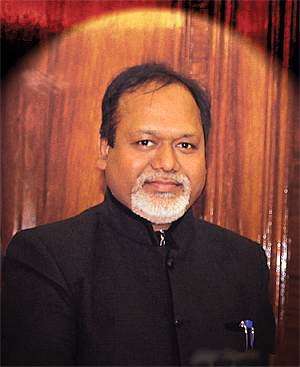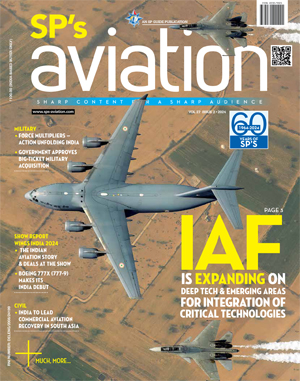INDIAN ARMED FORCES CHIEFS ON
OUR RELENTLESS AND FOCUSED PUBLISHING EFFORTS

SP Guide Publications puts forth a well compiled articulation of issues, pursuits and accomplishments of the Indian Army, over the years

I am confident that SP Guide Publications would continue to inform, inspire and influence.

My compliments to SP Guide Publications for informative and credible reportage on contemporary aerospace issues over the past six decades.
A Word from Editor-in-Chief
The Government of India is likely to approve purchase of additional 36 Rafale jets from Dassault Aviation of France which the combat fleet of the IAF badly needs

The military aviation scene in India has once again been humming with activity, the most recent one being the approval by the Defence Acquisition Council under the Ministry of Defence for the purchase of six AH-64E Apache attack helicopters for the aviation wing of the Indian Army. These six machines will be supplied by Boeing Defence, Space and Security (BDS) of the US that has already bagged a contract for 22 of these platforms for the Indian Air Force (IAF).
There is also an encouraging piece of news for the IAF that the Government of India is likely to approve purchase of the second lot of 36 Rafale jets from Dassault Aviation of France which the combat fleet of the IAF badly needs. The Indian Navy too is pursuing a case for the acquisition of 57 twin-engine combat aircraft for the new aircraft carrier INS Vikrant, currently under construction at the Cochin Shipyard. Options before the Indian Navy are the twin-engine F/A-18 Super Hornet from BDS and the Rafale from Dassault. A decision in favour of the latter could help facilitate induction of more Rafale jets into the IAF. This issue of SP’s Aviation carries reviews and analyses by Ranjit Kumar and Air Marshal B.K. Pandey (Retd) of the acquisitions of the different military aircraft in the offing.
While the acquisition of military aircraft currently in the pipeline are all from foreign sources, on August 26, the Indian aerospace major Hindustan Aeronautics Limited (HAL) unveiled at its facility in Bengaluru, the indigenously developed “Combat-Ready” model of the BAE Hawk Advanced Jet Trainer, dubbed as the Hawk-India. Also unveiled was the indigenously designed and developed Light Combat Helicopter (LCH) that is now going into series production. The event was a formal one and presided over by Arun Jaitley, Minister of Defence. A report on the event by Air Marshal B.K. Pandey (Retd) has been included in this issue.
Following in the footsteps of the US, Russia and China, India too is embarked on a journey into fifth generation combat platforms indigenously by way of the Advanced Medium Combat Aircraft (AMCA) as well as through collaboration with Sukhoi of Russia. In this issue, there is a detailed review by R. Chandrakanth of the developments across the globe in the regime of fifth generation platforms and where India stands in the race.
Writing from Vancouver in Canada, Byron Bohlman, an airline industry veteran for 35 years, looks at the high leasing costs that has a crippling effect on the Indian civil aviation industry. The author carries out an in-depth analysis of the complex dynamics that impinges on the financial health of operators and suggests remedial measures. Writing about regional aviation, R. Chandrakanth focuses on a major crisis looming large over the horizon for regional carriers both in the US and Canada. Regional carriers in these two nations are likely to be hit badly on account of shortage of qualified pilots. Both regular and regional aviation fleets are growing rapidly creating demand more greater number of pilots. Also, pilots employed by regional carriers, after having built up the requisite experience, move on to the major airlines where pay and perks are far more attractive, creating a problem for the regional carriers. This will inhibit investment in regional aviation thus affecting growth of the overall airline industry. On the other hand, the major global companies manufacturing jet engines for airliners are upbeat about future prospects as they are ramping up research and development to produce aero engines that will deliver greater fuel efficiency. In the wake of increasing demand by legacy carriers for larger airliners, the demand for engines with better fuel efficiency is also growing.
All these and more in this issue of SP’s Aviation. Welcome aboard and happy landings!





